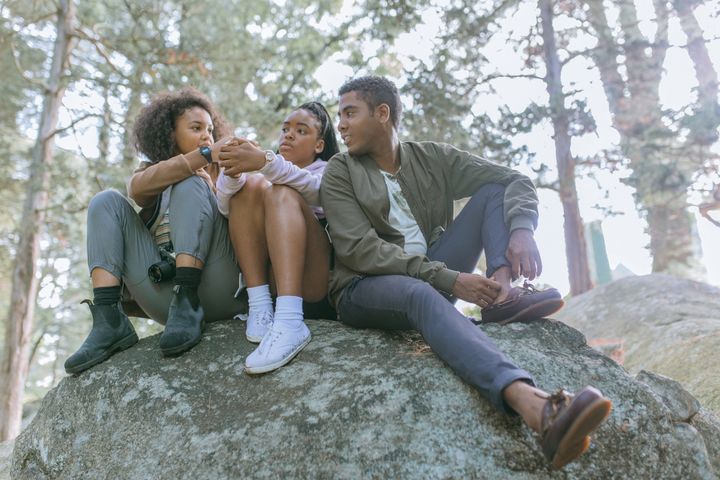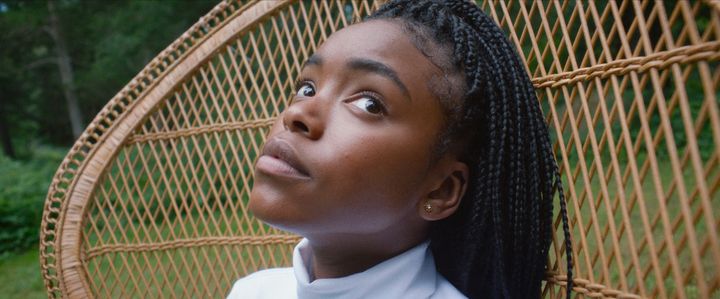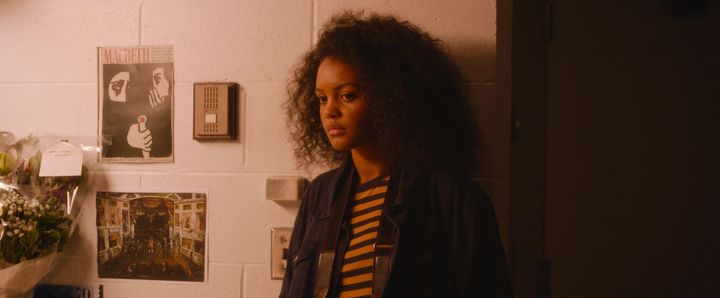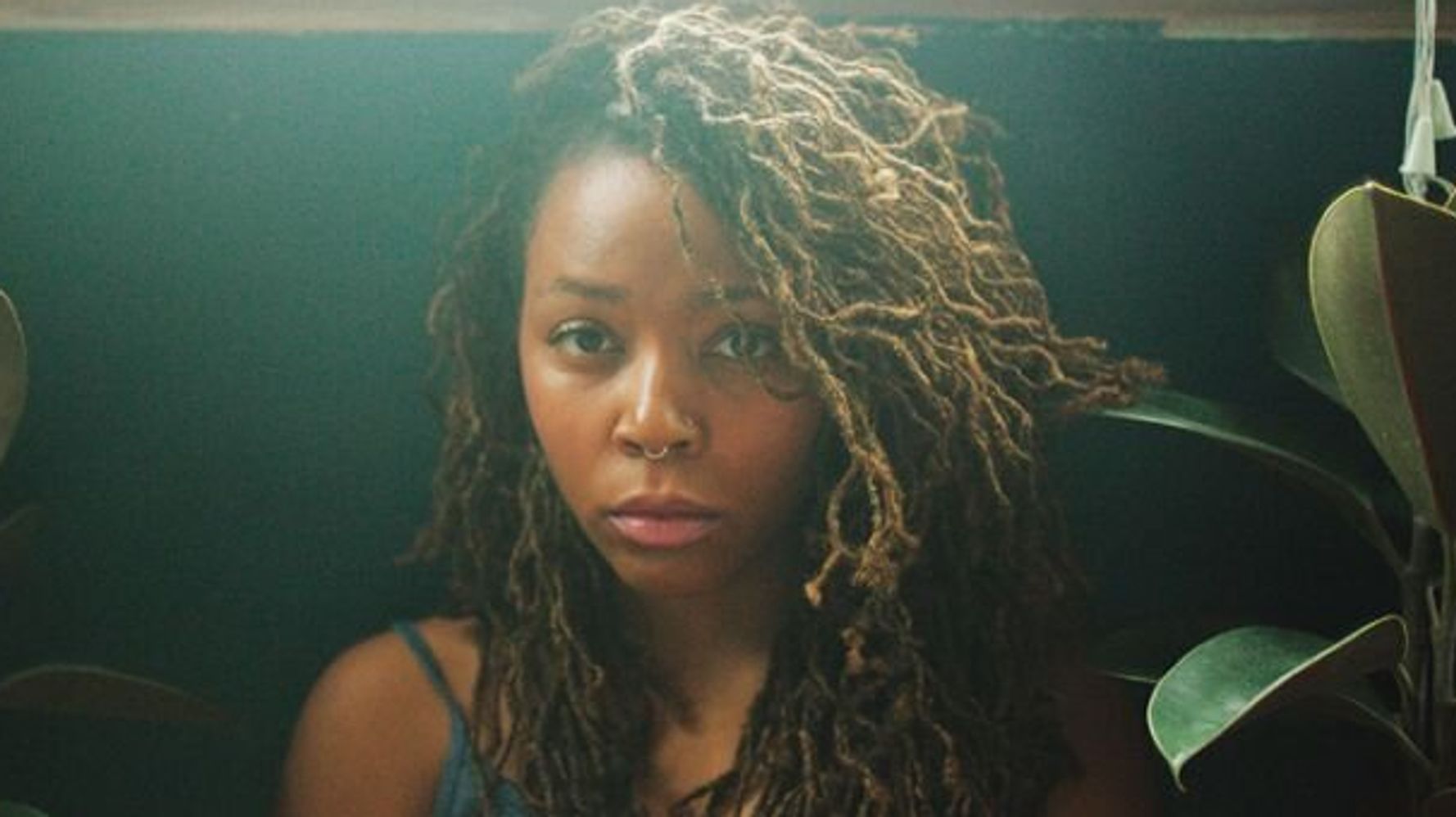[ad_1]
There’s a scene in Tayarisha Poe’s feature debut, “Selah and the Spades,” that will make you sit up and pay attention. In it, Paloma (Celeste O’Connor), a new student at an elite Philadelphia boarding school, slinks around the gymnasium taking pictures of the spirit squad, focusing most of her gaze and lens at Selah, one of the most powerful girls at school. With the team behind her speaking only when spoken to, Selah (Lovie Simone) goes into a stylistic diatribe about how, despite what the world may want them to do and be, they are, in fact, the ones in control. From the lengths of their skirts to the height of their burpees to the arch in their body rolls, they have autonomy and have no intention of letting it go.
“Because when you’re 17, you have to grab on to that control wherever you can and hold tight for dear life because they always try to take it from you, don’t they?” Selah asks.
With its abrupt cuts, off-kilter and out-of-focus close-ups and a steady drumbeat, it becomes crystal clear that this scene, inspired by Spike Lee’s love for surrealism, sets up a thread that runs throughout this indie gem: the importance of gaining and maintaining control. But for Selah, who may look innocent, there are no boundaries to how far she will go to stay on top of her grades, her lucrative drug-running game and her easily manipulated friends Paloma and Maxxie (Jerome Jharrel). But what happens when a control freak feels all that power slowly slip away? In Selah’s case, she begins to crack and unleashes on anyone who poses a threat to her legacy.
While Poe has crafted this cunning and, at times, terrifying villain, her nuanced script carves out just enough space to humanize Selah, with Simone leaning into those moments, giving one of the most memorable performances of the year. Yes, this film thematically and tonally feels familiar — “Heathers,” “Lord of the Flies” and even “Goodfellas” — but with Poe at the helm, centering on this Black girl at this school with these problems, the result feels refreshing and brand new.
HuffPost sat down with the 30-year-old Philadelphia native to talk about her own experiences attending boarding school to create this insular world and how this new rise in indie films about Black girlhood makes her “so fucking happy.”
Before we get into the film, let’s talk about your beginnings. When did you know that you wanted to be a filmmaker?
Specifically, when I was in college, but before then, I was always writing stories since I was a little kid. I didn’t have the language back then that I wanted to be a director or screenwriter. I actually thought I was going to be a lawyer and go to trial and somehow convince people of what I wrote in stories. I didn’t know. [Laughs] But when I got to college, it hit me that regular people are the people making movies and that you don’t have to go to the school they tell you to go to or know the exact person they tell you you need to know, you just have to make a movie.
What do you love about filmmaking?
With writing, I daydream a lot, even now, but less because I have a job and bills. But part of daydreaming and writing feel like the same thing, a chance for you to create a new world completely of your own making. I love that! Now, when it comes to directing, I love being around other people and collaborating with them. With writing, you spend so much time alone and everything is in your hands and comes down to you, but with directing, it’s a community coming together to tell a story.

With your love for storytelling, why was “Selah and the Spades” the story you wanted to tell?
[Like Selah], I also went to boarding school for high school. Growing up and watching TV shows, it was always such a shock to me when the students would go home to their parents at the end of the day. Like, their parents had so much access to their teenagers’ lives. I found as a teenager, it was so much more thrilling and easier to be away from home. Now, high school was hard, really hard, but it was also really fun. I lived with my friends and got to eat ramen at midnight while studying for exams. There was also an insularness to my world, it felt like being in a microcosm of society: We even had our own language. So I wanted to tell a story that captured some of that.
Speaking of insular worlds, outside of Selah going home, the entire film takes place on the school’s campus. Did you write it that way at first, constantly thinking about budget restraints, or for the first draft did you go all in not worrying about money?
With the first draft, I had a bridge with this train wreck and they fall off the bridge into a lake and then there is this whole scene with them underwater. [Laughs] There was no way, but I wrote that scene like I had all the money and resources in the world, which is what we should all do. Show people that you know what you want, think big in the beginning. But then, yes, I did spend time making it more achievable.
Even in this insular world, it’s even more insular. Outside of Selah, her friends, the other three cliques and maybe the headmasterl (played by Jesse Williams), we don’t see a lot of other students. It’s so tightly shot, which must be intentional. It’s a risk, but it works.
It’s shot like that because the perspective is extremely focused. You are in Selah’s focus. You’re paying attention to what she is paying attention to. And all of this beauty and luxury of this campus, you only see pockets of it, because she is used to it, bored by it even. Selah is fixated on figuring out her legacy. It was a risk, and I had to fight for it, convince people that this was the way we should go.
Usually, with a story like this, we would enter this world through Paloma’s character, the younger person who is learning through her teacher, Selah. But I kept asking myself, why the fuck am I making this story? I remember being 13 and everyone telling me how angry I was. I wasn’t angry. I was confused and emotional, trying to figure things out, so I wrote this for her.

Speaking of Selah… boy, she is something else! Her mother, her obsession with grades, perfection, all of that, but her need to control. It gave me so much anxiety.
Going into the script, her being controlling was always the facet of who she is, and it’s generational: those scenes with her mother [played by Gina Torres] who is constantly talking about Selah’s potential. All of that made Selah become someone obsessed with being able to understand other people’s potential and what they are capable of, hence Paloma.
But for Selah, her control comes directly from the desire to feel safe. This is something I didn’t understand while writing the script, but I definitely feel and understand it now. Recently, I was telling my mom how thrown off I’ve felt since the coronavirus and being locked in, and she was like, “That’s because you can’t project yourself two months into the future, you can’t plan your life and you don’t know what it’s going to look like.”
Selah doesn’t fare well with uncertainty either. Control makes us feel safe, and when you’re Black and a girl and so many people are trying to control you and take your control away, you can feel out of whack and lash out.
That’s what I appreciate about the film, is that even in her awfulness, she’s not a full-on monster. Selah lives with the things she does to other people; she thinks about it. That’s important for all characters, but especially for Black ones.
It’s so rare that we even get to see Black people on screen just thinking about things, contemplating their lives. So much of our stories are about trying to escape trauma, encountering it and recovering from it. But for Selah, I hate even saying it, but for her, she is the traumatizer. And we get to see her thinking about it. But we also get to see people thinking in the film outside of these moments of doing damage to others, but just Black people outside daydreaming, playing, shooting the fucking breeze. That’s why I love that scene of Selah, Paloma and Maxie running around outside and having fun. I don’t always want to feel like I have to save the world; there are times when I just want to exist and chill.
Last week a friend of mine asked me if the film was queer, given this tension between Selah and Paloma. I initially said no, but I’m thinking yes, maybe? What say you?
Lovie, Celeste and I talked about the characters’ sexuality a lot, but do you really want to know what I think?
I absolutely want to know! [Laughs]
I think Selah is asexual, but she doesn’t have the words for it, which happens. For Paloma, she can fall in love with anybody and loves love, and she wants to be loved, which is why she does all of these things for Selah. This is a story about power and unrequited love. And Selah knows how desperate Paloma is to be loved by her. Selah will never love her the way she wants her to, but she will use Paloma’s love to get what she wants, every single time.
Damn, Selah really is the absolute worst.

Right? But in terms of sexuality, it was important for me to make these characters who they were but not make it this huge talking point. When I was in high school, I didn’t have the language for my sexual identity, and I still don’t feel like I do now, even having more access to language. Any label past Tayarisha, I don’t want it. I am like, “Oh, I feel this way today, but will I feel this way tomorrow?” So in the script, the characters kind of follow that same thinking. They just are who they are.
One of the most important jobs of a director is working with actors to build a bond off-set that will translate on set and on the screen. What did you do to cultivate your relationship with them?
First, it was very important for me to help build those bonds between them because if people don’t like each other, you can see that on screen. But now Lovie and Celeste are best friends. They have gone on vacation multiple times. It’s great. As a director, I had to build comradery with them as well. I just turned 30, so I was 28 when we made the film, but I treated them as equals, like a big sister. Also, it was about me being able to be vulnerable with them and talk about how I felt when I was a teenager and how looking back, I had grown from those experiences. That matters, because none of this was going to work unless each of them could embody that teenager and make it believable. That means they had to be comfortable with each other and with me.
That’s about trust. One of my favorite details in the film is the scene where they were all on the bus getting ready for prom and Selah is sitting down, gelling her edges with a toothbrush. I love it so much. But it wasn’t written like that. It may have had her doing something generic, like reapplying her lipstick, but Lovie came up to me and asked can she do her edges instead, and it was so sweet and so perfect, and she trusted me enough to say something and trusted that I would listen to her.
Right now, this is an exciting moment in filmmaking. From “Jinn” to “Jezebel” to “Premature” to the upcoming “Miss Juneteenth,” “Selah and the Spades” is part of this important rise in Black filmmakers exploring Black girlhood. It’s amazing but, most important, I better not hear one more person on Twitter talking about “Where is our Black ‘Lady Bird’?” Girl, bye.
Right! That conversation is over, dead. And for folks who keep asking that, they deserve every ounce of Twitter hate that comes their way! [Laughs] But, yes, it feels fucking amazing to be part of this moment. This is exactly what I wanted when I was a teenager; this is what I lived for. And to see these other filmmakers, who are not too much older or younger than me… we must have all been as teenagers like “Jesus fucking Christ, I just want a movie about me at this age, trying to figure our lives!”
So to be releasing my film right now, with them, it’s amazing. This right here is a moment in time, we are making history and this movement is only getting stronger.
Calling all HuffPost superfans!
Sign up for membership to become a founding member and help shape HuffPost’s next chapter
[ad_2]
Source link

